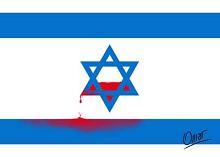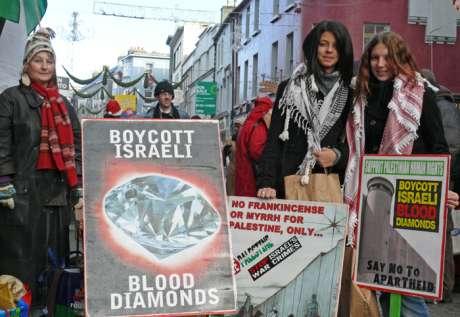Diamond market heavily contaminated with Israeli blood diamonds
Press Release Thursday December 20, 2007
By IPSC - Ireland-Palestine Solidarity Campaign
Last weekend members of the Ireland-Paleatine Solidarity Campaign (IPSC) were on the streets in Dublin, Galway and Limerick to inform shoppers about the likelihood of unwittingly supporting the apartheid regime in Israel if they purchase diamonds without knowing where they were crafted.
In the run up to Christmas the IPSC has stepped up its campaign to alert the public about the contamination of the diamond market with Israeli blood diamonds. Jewellers in Ireland (and elsewhere) are using their compliance with the UN Kimberly Process as a fig leaf to disguise the fact that they are selling diamonds crafted in apartheid Israel.
The problem for consumers at the moment is that unless a diamond has been branded by laser inscription it is impossible to distinguish a diamond crafted in Israel from a diamond crafted in a country that respects human rights and international law.
Jewellers claim that their diamonds are "conflict free" but fail to mention that the definition of conflict diamond includes only uncut or rough diamonds and disregards the much more lucrative trade in cut and polished diamonds from conflict zones. Israel is the world's leading producer of polished diamonds, a trade which accounts for 30% of Israel's total manufacturing exports.
The trade in polished diamonds from Israel helps fund genocide, ethnic cleansing and other human rights abuses being perpetrated daily against the Palestinian people. Diamonds crafted in Israel are de facto blood diamonds. Consumers should have the right to know where their diamonds were crafted and the right to choose Israel-free diamonds.
END
For comment contact: Sean Clinton – 087-2725300, 061-386203
THE CASE FOR AN INTERNATIONAL CAMPAIGN TARGETING ISRAELI BLOOD DIAMONDS IN 2007
Feb 20, 2007
[Campaign developed by the Ireland solidarity movement]
An international campaign to boycott Israeli blood diamonds in 2007 make sense, for the following reasons;
The diamond industry is one of the most important cash cow of the Israeli economy. In almost all statistical data published for the Israeli economy the diamond sector is dealt with separately from all other industrial sectors as its value is completely out of proportion to all others. In 2005 polished gemstones comprised 30% of total manufacturing output in Israel. http://www.moital.gov.il/NR/rdonlyres/259472D8-422C-4516-A1B9-98B3546CB959/0/DIAMOND_2005.pdf
The value of polished gemstones exports from Israeli in 2005 was 16 billion US dollars. http://www.intracen.org/tradstat/sitc3-3d/ep667.htm Those figures are worth repeating:
30% of total manufacturing output and 16 billion US dollars in 2005.
No other sector of the Israeli economy, with such a significant financial impact, can be as easily identified, isolated, attacked and tarnished.
No other consumer purchase of Israeli goods is of such a special personal significance and importance, as the slogan says, "a diamond is forever".
No other sector of the Israeli economy is so dependant on the individual consumer choice and perception, which makes it uniquely vulnerable to negative publicity. When consumers purchase chemicals or technology they do so out of necessity, usually work related, not for personal reasons. When they purchase gemstones it's a very personal decision and an expensive one. Anything that tarnishes the image of Israeli diamonds can have a huge bearing on consumer behaviour.
The existence of the UN based Kimberley process for the regulation of the trade in rough diamonds provides a ready-made platform for us to stand on. It has set a precedent which we can use to pressurise jewellers and their representative associations to apply the same strictures to Israeli polished diamonds as they do to rough diamonds from other conflict zones, - or does their humanitarian concern not extend to innocent Palestinians under the cosh of the diamond sponsored Israeli military? The narrow definition of blood diamonds as defined by the Kimberley process affords us plenty of scope to attack the hypocrisy of the system. It states "conflict diamonds, also known as "blood" diamonds, are rough diamonds used by rebel movements or their allies to finance armed conflict aimed at undermining legitimate governments."
30% of total manufacturing output and 16 billion US dollars in 2005
Linkage between the massacres of Qana I & II and the Israeli diamond trade can be made by:
- Dedicating the campaign in remembrance of the victims of Qana, by calling it the Qana Initiative (or something similar),
- Launching the campaign in Qana on 30th July 2007, the anniversary of last years massacre and
- By emphasising the irony that profits and taxes from the Israeli diamond business fund the purchase of laser guided bombs which destroyed the lives of women and children in the town believed by many to the location of the miracle of the wedding feast referred to in the bible.
It would in some way be a fitting tribute to all the victims of the massacres at Qana if their deaths become a rallying call for a campaign that might eventually seriously impact the Israeli economy and indelibly tarnish Israel's image internationally.
(I have reason to believe that this is an idea would find favour with the victims relatives and public representatives in Qana.)
Linkage with Qana would afford the campaign four dates around which the campaign could be focused and reenergised each year, 18th April, Qana I, 30th July Qana II, Christmas time and Valentines day, 14th Feb. the later two being peak sales times for obvious reasons.
Public information awareness raising exercises (pickets) outside of jeweller shops in the capital cities of participating countries at these times would be a matter of some concern for jewellers.
30% of total manufacturing output and 16 billion US dollars in 2005
If a campaign can be coordinated by solidarity groups internationally it can be launched as a global campaign which would give the campaign more credibility and not looked upon as just a local initiative. This as far as I am aware would be the first for GPS (Global Palestine Solidarity) and would undoubtedly strengthen bonds between organisations worldwide from which new initiatives might flow.
We would not be asking consumers to stop buying diamonds, we would be asking them to insist the diamonds they purchase are certifiably "Israeli free" and therefore "Qana compliant"?. This is something that all jewellers cannot do right away and would require the introduction of a marking system to avoid tarnishing all diamonds (not our problem). From a human rights stand we should be advocating that people purchase diamonds crafted in Canada or South African. Some Canadian manufacturers inscribe their diamonds using a microscopic laser, thus making them distinguishable.
Diamonds are cut and polished in India, Antwerp, Canada, South Africa and Australia, but Israel and Antwerp are by far the most important centres where the majority of high value fashion diamonds are polished. Consumer pressure would force Jewellers to provide certifiably Israeli free diamonds. Most of the diamonds manufacturers in India employ child labour.
With a relatively long lead in time (seven months) we can plan to maximise publicity. Unlike other sectors of the Israeli economy, Diamonds are publicity magnets. No one is interested in a software, hardware chemicals or a vegetable boycott, diamonds by comparison are a far easier sell.
The release of the film Blood Diamond has generated a lot of discussion in the media recently about Conflict Diamonds. When it opens in Europe in February it will add further to the debate and present opportunities to introduce the issue of Israeli blood diamonds.
30% of total manufacturing output and 16 billion US dollars in 2005
Any campaign like this would take years to have a significant impact, but the publicity which it could attract would be just as important for the whole BDS campaign. Even if the campaign failed to dent the trade in Israeli diamond sales it could still generate a lot of valuable publicity and increase the public association of Israel with war crimes and crimes against humanity.
The Arab satellite channels could probably be persuaded to take the story.
A number of celebrities, people in the arts worlds and prominent politicians could be persuaded to back the campaign..
Funding for such a potentially far reaching and damaging campaign might be made available by sympathetic sources internationally.
For these reasons I believe the Israeli diamond business can be impacted. It is one of the main arteries of the Israeli economy, one that feeds the Zionist cancer-engulfing Palestine. It can be severed.
An Israeli Blood Diamond is Forever.... on your conscience
Some useful links
http://www.globalpolicy.org/security/issues/diamond/kimberlindex.htm - a very informative site, critical of the flaws in the Kimberley process with links to related actions and stories.
http://www.conflictfreediamonds.org/index.html
Starting here, our first task is to expose the narrow definition used to designate rough diamonds from specific regions as "conflict" diamonds thereby deliberately drawing public attention away from other more obvious and equally sinister Israeli regime which relies on revenue from the diamond industry to sustain their brutal oppression and subjugation of others.
http://www.intracen.org/tradstat/sitc3-3d/ep667.htm - International trade statistics - Israel, by a small margin was second to Belgium, exporting 16 billion US$ worth of gem stones in 2005, that's ahead of India, which exported 12 billion, US $.
http://www.diamonds-natural.com/index_home.asp?left_banners=banners/left_banners/banner_1.html&main=main_pages/home_articles/home/articles_home_1.html
General info about the diamond industryhttp://www.gemex.com.au/forums/index.php/diamond_links a good source of information about the structures controlling the diamond industry worldwide. It states "The ultimate mandate for the World Diamond Council is the development, implementation and oversight of a tracking system for the export and import of rough diamonds to prevent the exploitation of diamonds for illicit purposes such as war and inhumane acts. Notice no mention of the use of polished diamonds for the murder, theft and brutal subjugation of others.
http://www.diamond-key.com/companies/israel/ links to the key Israeli diamond manufacturers
http://ec.europa.eu/trade/issues/bilateral/countries/israel/index_en.htm EU- Israel trade which says " Israel trade statistics are traditionally distorted by the substantial trade in precious stones (diamonds), which accounts for more than 30% of total bilateral trade."
http://english.aljazeera.net/news/archive/archive?ArchiveId=38387 Article about newly formed association of African diamond producing countries
http://www.nrcan.gc.ca/ms/diam/index_e.htm info about the Canadian diamond industry
http://www.canadianjewellers.com/ Canadian Jewellers Association
http://en.wikipedia.org/wiki/Diamond - general info about diamonds.
http://www.emporia.edu/earthsci/amber/go340/diamond.htm - a very useful site with loads of info about the chemistry and history of the diamonds, and other useful links.
http://www.worlddiamondcouncil.com/ the world diamond council
http://www.israelidiamond.co.il/English/index.aspx The Israeli Diamond Industry
http://www.keyguide.net/sightholders/ diamond sight holders
http://www.terremoto.ca/diamond.html links to companies involved in the Canadian diamond industry
http://www.costellos.com.au/diamonds/industry.html the Australian Diamond industry
http://ihscslnews.org/view_article.php?id=61 "India gets all the really small diamonds to cut and these diamonds and gems demand the keenest of eyes." - Child labour
http://www.american.edu/TED/diamond.htm India has a thriving diamond trade only because it is willing to cut and polish diamonds that other countries would discard as industrial quality, and are able to use child and other disadvantaged labour to make trading economically viable.
http://www.edwardjayepstein.com/diamond/chap13.htm great source of information about De Beers diamond cartel
http://www.mof.gov.il/beinle/ie/glance_eco2003.htm Israeli gov. web site which states "In 2002, Israel's exports (excl. diamonds) came to $ 19,122.7 million". The value of the Israeli diamond industry is such that it is treated separately in order to avoid skewing the rest of their trade statistics.
http://www.mof.gov.il/beinle/economic_indicators2004.htm Exports of goods were $8.2 billion in the first quarter of 2004, 15.0 percent higher than in the first quarter of 2003 and 10.8 percent up from the fourth quarter of 2003. Total imports were $9.7 billion in the first quarter of 2004, up 21.3 percent relative to the first quarter of 2003 and 7.4 percent higher than in the fourth quarter of 2003. Additionally, imports of industrial raw materials (excluding diamonds) increased impressively in the past few months-an important indicator of future upturns in industrial output, exports, and consumption
http://www.moital.gov.il/NR/rdonlyres/259472D8-422C-4516-A1B9-98B3546CB959/0/DIAMOND_2005.pdf Israelis Gov. site which gives a breakdown of diamond exports for 2005.
For more information on Israel and blood diamonds please read the documents on:
|
Races? Only one Human race United We Stand, Divided We Fall |
 |
No time to waste. Act now! Tomorrow it will be too late |
|




































